Repairing Moisture-Damaged Stone Masonry in Jenkintown
Repairing moisture damaged stone masonry in Jenkintown takes more than patchwork.
4 min read
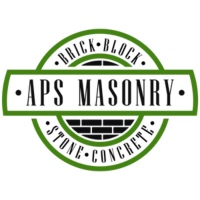 Alec Serowatka
:
Aug 8, 2025 12:37:00 PM
Alec Serowatka
:
Aug 8, 2025 12:37:00 PM
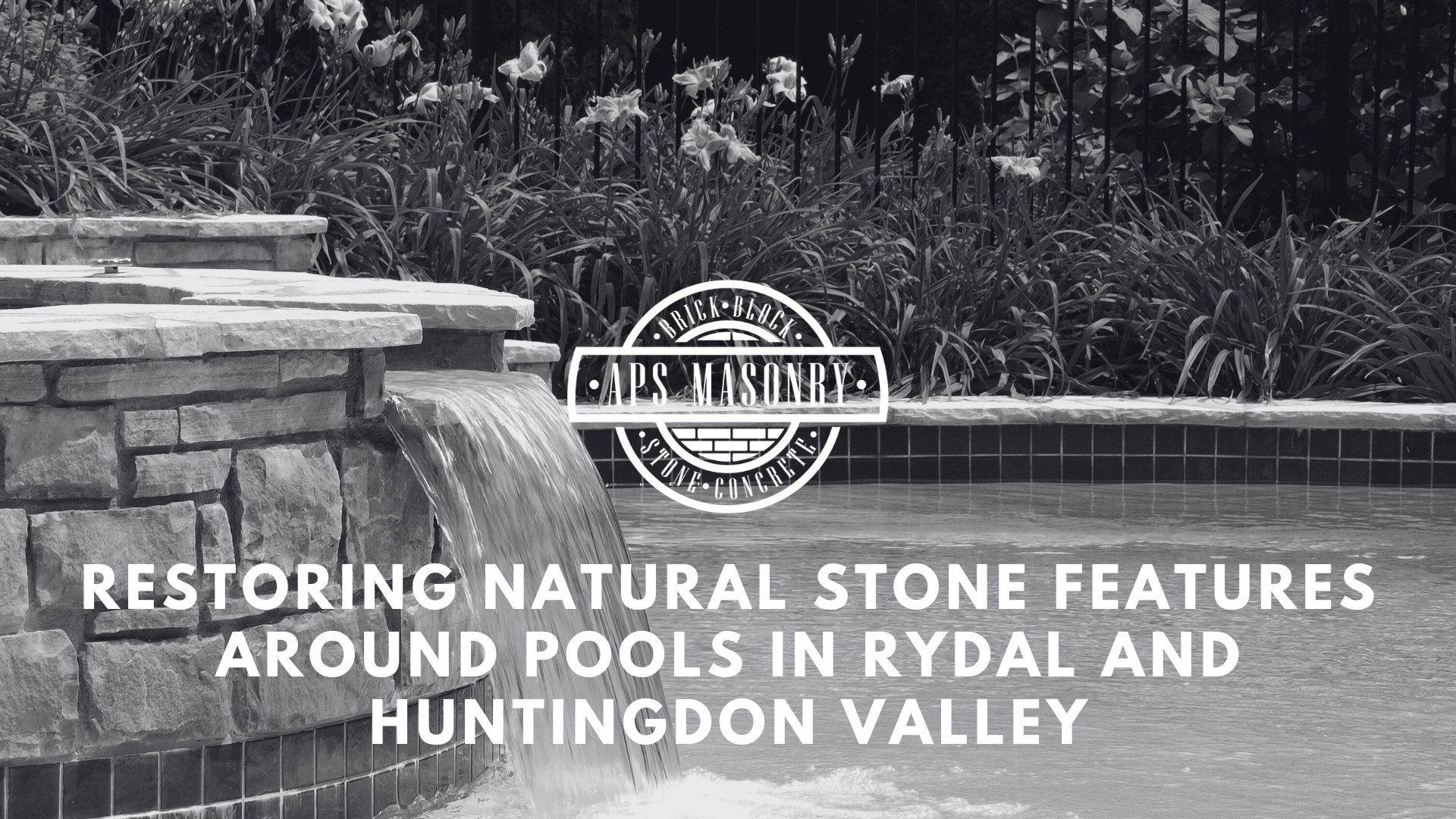
Natural stone surfaces deserve skilled maintenance and restoration to keep your pool deck safe, stylish, and built to last.
The pool area is a central feature of your home. It’s where guests gather, family relaxes, and the quality of your outdoor space is most visible. In Rydal and Huntingdon Valley, that space often includes natural stone surfaces: flagstone, marble, granite, and natural stone pavers. These materials carry visual weight and real estate value. They require proper maintenance to keep both.
Natural stone around pools must stand up to water exposure, regular cleaning, pool chemicals, and shifting seasonal conditions. Pool owners see issues start with uneven surfaces, rust stains near coping, or tough stains that settle deep into the stone deck. These early signs call for action. Regular maintenance, sealing, and deep cleaning prevent further damage and protect the structural integrity of the entire surface.
Our team at APS Masonry Contracting works hands-on with natural stone pavers and other materials every season. We handle routine cleaning, stone pool deck restoration, and specialized services like rust remover application and stain correction using a pH neutral cleaner.
APS Masonry Contracting offers a targeted set of restoration services specific to pool environments, where natural stone is exposed to chlorine, freeze-thaw cycles, UV damage, and foot traffic. These services include:
Repointing and Joint Repair
Mortar joints between stone pavers and coping crack or wash out over time. Repointing restores both strength and appearance, preventing water from reaching the base layer.
Stone Resetting and Leveling
Shifting soils, improper drainage, or years of use cause stones to sink or tilt. We lift and re-bed stone pavers to restore even surfaces and eliminate tripping hazards.
Surface Cleaning and Stain Removal
Rust stains from metal furniture, mineral buildup from hard water, and organic stains from leaves or algae require professional tools and methods. We use pH neutral cleaners, poultices, and non-abrasive tools to treat the affected area without degrading the stone.
Sealing and Surface Protection
After cleaning, surfaces are sealed with breathable, stone-safe products. Sealing reduces moisture absorption, prevents staining, and extends the time between cleanings.
Crack Repairs and Edge Restoration
Cracked flagstone or chipped granite coping is repaired or replaced with matching materials to restore continuity across the pool area.
In Rydal and Huntingdon Valley, properties often feature large-format flagstone, custom-cut bluestone, and marble or granite inlays. These materials are long-lasting but not maintenance-free. Common restoration requests from local homeowners include:
Coping stone realignment around older pools
Removal of mineral staining from irrigation runoff or chlorinated water
Resurfacing of faded or dulled bluestone patios exposed to UV and chemical wear
Replacement of cracked pavers near water features or spa spillovers
Moss and mildew remediation on shaded, unsealed stone decks
These aren’t cosmetic concerns. They directly affect surface safety, drainage, and long-term material stability.
Some of it, yes — but not all.
Good maintenance delays restoration, especially when it includes:
Routine cleaning with clean water and the right tools
Prompt removal of dirt and debris
Annual sealing with stone-appropriate products
Avoidance of harsh chemicals and acidic cleaners
That said, even the best maintenance doesn’t stop time, weather, or shifting substrates. Restoration becomes necessary when:
Mortar joints crack or wash out
Pavers settle or shift from freeze-thaw cycles
Surface staining exceeds what cleaning removes
Water starts to penetrate below the surface
Think of maintenance as the short-term safeguard and restoration as the long-term reset. Read more maintenance tips for your pool.
Aesthetic Appeal
Restoration revives original color, texture, and stone definition. A dull pool deck regains its contrast. A faded bluestone path looks newly installed. Visitors see a well-maintained, high-value property.
Safety and Function
Leveling eliminates trip hazards. Sealing improves slip resistance. Clean surfaces reduce algae and mildew growth. Every repair improves both beauty and usability.
Property Value
In high-income zip codes like 19006 and 19046, outdoor living features directly influence market value. A restored stone pool area contributes to curb appeal, lifestyle experience, and real estate desirability.
Natural stone surfaces define outdoor living in Rydal and Huntingdon Valley. These properties feature pool areas where the surface matters as much as the structure. Homeowners in these neighborhoods often choose natural stone pavers to frame raised spas, outline water features, or build tiered lounging areas that blend into mature landscaping. Granite slabs serve as coping stones along perimeter edges. Marble is frequently set into walkways that lead from pool to patio. These are not aesthetic gestures. These are deliberate design decisions that match the scale and permanence of the homes they surround.
Stone pavers installed around pools need more than visual appeal. They must tolerate regular exposure to pool water, direct sun, and Philadelphia’s seasonal cycles. Pool owners who choose natural stone materials rely on proper maintenance to retain color and structure across wide surface areas. Routine maintenance prevents staining, reduces water damage, and keeps the stone deck safe. The stone pool deck becomes part of the home’s usable footprint, often extending from indoor entertaining areas to outdoor kitchens. When these surfaces are protected and maintained, they raise the function and market appeal of the property itself.
Unlike composite materials or stamped concrete, natural stone surfaces can be restored. Restoration services range from deep cleaning to full repointing or surface leveling. When rust stains from patio furniture or staining from pool chemicals appear, they require more than a rinse. Affected areas respond well to targeted techniques such as rust remover application or a pH neutral cleaner combined with soft brushing. For more stubborn stains, baking soda slurry or poultice treatments provide results without causing permanent damage. Regular cleaning and proper product use keep these surfaces functional, safe, and attractive.
There is a wide array of restoration methods available, depending on material type and existing damage. Abrasive cleaners are never used. Instead, clean cloths, non-acidic solutions, and soft brushes preserve both texture and tone. Removing debris from wet areas is an essential step, especially in high-traffic zones like diving board entries or shallow sun shelves. Routine cleaning and smart care choices prevent long-term surface wear and limit the risk of structural failure.
Natural stone maintenance starts with the homeowner. Routine cleaning, the use of clean water, and the right materials keep pool surfaces in good condition between professional visits. Most issues begin when pool owners neglect to remove dirt from wet areas or delay scheduled care. Cleaning and maintenance is not a seasonal task; it is part of owning a stone pool area.
Which decking material is best for your home?
Rydal and Huntingdon Valley homeowners often use products meant for other materials. Harsh chemicals designed for tile or concrete cause damage to natural stone. These compounds degrade color, loosen joints, and strip protective sealants. Avoid harsh chemicals completely. A pH neutral cleaner, used with soft brushes and clean cloths, keeps the surface intact and reduces the chance of permanent damage.
When maintenance no longer solves the problem, restoration begins. The restoration process corrects surface wear, water damage, and structural issues that routine maintenance does not. Staining, joint erosion, or uneven settling across large areas requires more than homeowner care.
APS Masonry Contracting handles your natural stone feature repairs with local expertise, using tailored methods to restore stone without disrupting the surrounding hardscape and natural beauty. Timely service stops further breakdown and keeps the value of your pool area intact. Maintenance preserves, restoration protects. Contact us today!
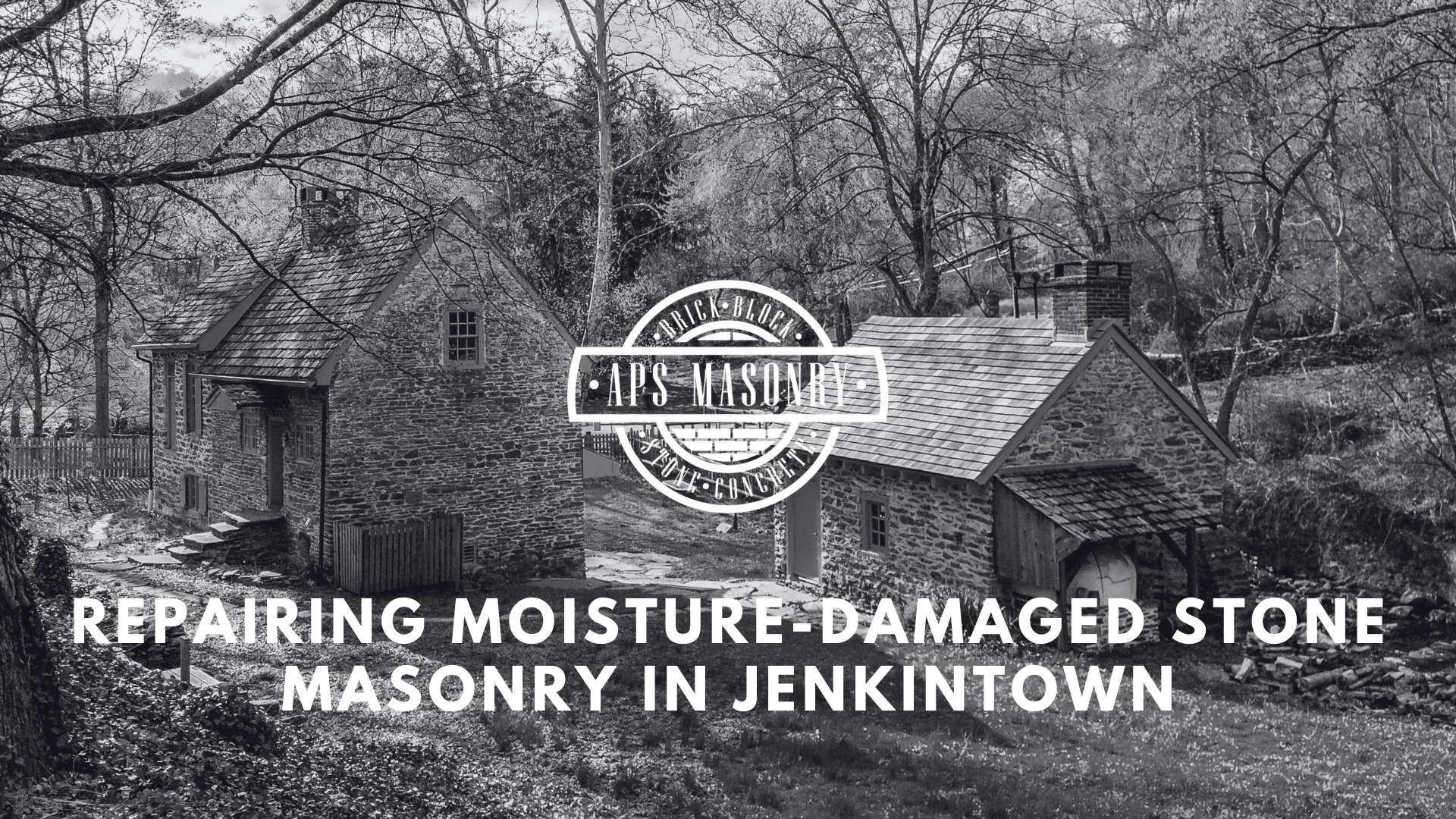
Repairing moisture damaged stone masonry in Jenkintown takes more than patchwork.
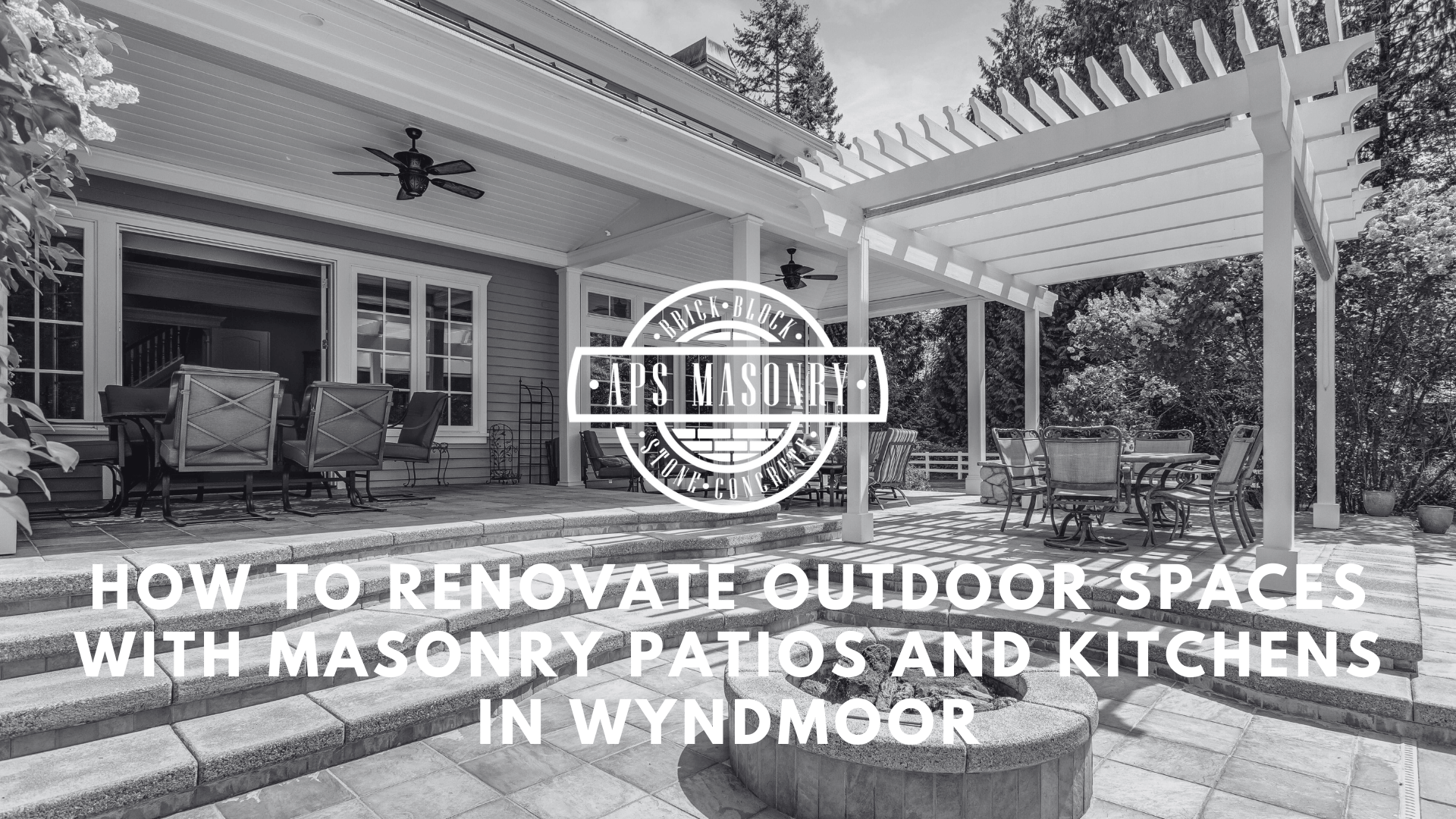
A custom patio and fully equipped outdoor kitchen will completely transform the way your family uses the backyard.
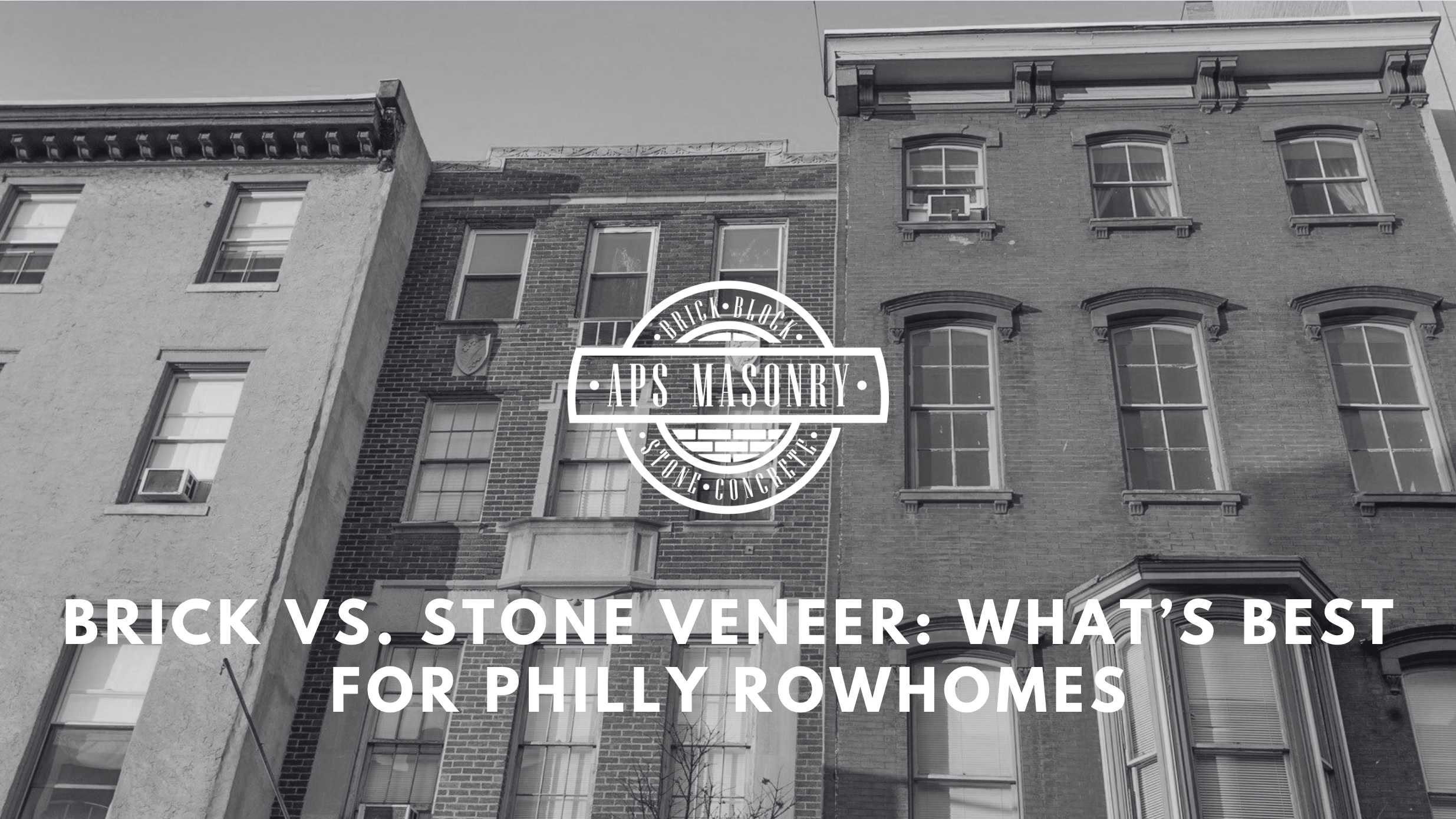
Brick builds legacy on Philly rowhomes while stone veneer creates options where weight, cost, or structure limit traditional brick construction.